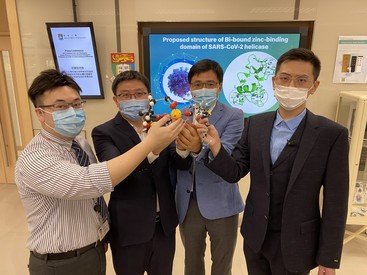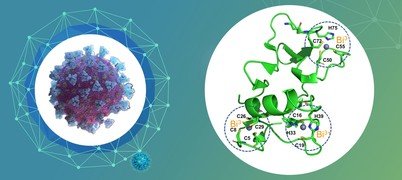Developing Bismuth Drugs to Fight COVID-19
Bismuth drugs to fight emerging infectious diseases
Under a research led by Professor Hongzhe Sun and team members Dr Hongyan Li and Dr Runming Wang of the Department of Chemistry and Dr Shuofeng Yuan of the Department of Microbiology, a bismuth drug has emerged as a leading source of hope in the fight against COVID-19.
The bismuth drug RBC — ranitidine bismuth citrate — has been found to be potentially effective in the fight against COVID-19, also known as SARS-CoV-2. Bismuth is a brittle, crystalline white metal. Bismuth drugs are among several metal-based drugs that are showing positive results in fighting infections caused by superbugs. While RBC has long been used to treat stomach ailments and ulcers in particular, the potential for drugs based on metal compounds to be used to fight viruses has been largely untapped until now.
RBC acts by stopping the virus from replicating itself inside cells, effectively suppressing the virus and eliminating its symptoms. When tested on hamsters, the drug has been shown to lead to a massive reduction of the viral load in the lungs and nasal cavities. It works by stopping the double strands of COVID-19’s DNA from unravelling into single strands, an essential step that enables the virus to replicate itself before it starts infecting other cells.
In the fight against COVID-19, that could make it at least as effective as the new antiviral drug, Remdesivir, which has been in short supply during the pandemic. As it has already been in use for decades, RBC is known to be safe and can be tested in clinical trials faster than new drugs. RBC is also much cheaper to produce than Remdesivir.
A related bismuth drug is now being administered orally in the phase 3 clinical trials of COVID-19 patients in China. Once the trials are completed, bismuth-based drug is expected to play a huge role in the fight against the coronavirus globally by expanding the range of therapeutic options to treat the disease, as well as being used to treat other serious diseases. This novel antiviral strategy for treatment of COVID-19 has been published online in a scientific journal Nature Microbiology. A related patent has also been filed in the United States.
The team is working on adjusting RBC so that it can be injected into the body intravenously to fight the virus in cells.
Professor Sun has been researching bismuth drugs since 2002 when he led a team that examined how bismuth drugs behave in gastric acid and their potential for use against Helicobacter pylori, a bacterium that often enters the body during childhood and lives in the digestive tract. The bacteria cause abdominal pain and nausea and is a common cause of peptic ulcers. He moved on to examine how bismuth drugs could be used to fight viruses and how the drugs could act as antimicrobial resistance breakers in the treatment of bacterial infections that are resistant to many drugs.
Professor Hongzhe Sun and his team members, Dr Hongyan Li and Dr Runming Wang of the Department of Chemistry, and Dr Shuofeng Yuan of the Department of Microbiology, received the Faculty Knowledge Exchange Award 2021 of the Faculty of Science for the project ‘Development of Bismuth Drugs for the Treatment of Microbial Infections’.





